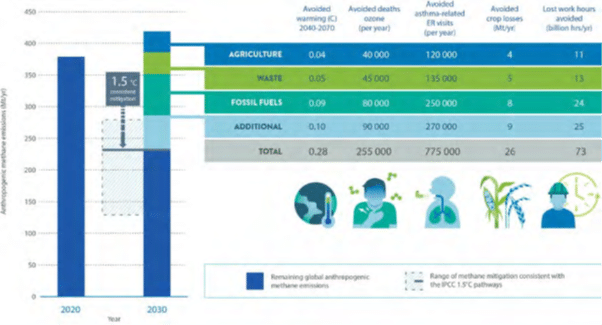
Tackling methane emissions the key to averting climate catastrophe, says UN
Tackling methane emissions caused by human activity is the most ‘immediate and cost-effective’ way to deliver the Paris Agreement target to keep global warming below 2C, ideally 1.5C.
That is the conclusion of an in-depth report from the United Nations Environment Programme and Climate and Clean Air Coalition (To Reduce Short-Lived Climate Pollutants).
 The Global Methane Assessment outlines the benefits of mitigating methane, a key ingredient in smog, which include preventing some 260,000 premature deaths and 775,000 asthma-related hospital visits annually, as well as 25 million tonnes in crop losses.
The Global Methane Assessment outlines the benefits of mitigating methane, a key ingredient in smog, which include preventing some 260,000 premature deaths and 775,000 asthma-related hospital visits annually, as well as 25 million tonnes in crop losses.
“Cutting methane is the strongest lever we have to slow climate change over the next 25 years and complements necessary efforts to reduce carbon dioxide. The benefits to society, economies, and the environment are numerous and far outweigh the cost”, says Inger Andersen, the UNEP Executive Director.
Biogas is a low cost readily available solution
Methane is an extremely powerful greenhouse gas, responsible for around 30 per cent of warming since the pre-industrial era. As a short-lived climate pollutant – 20-25 years compared to CO2’s hundreds of years – It has a warming potential over 83 times more potent than CO2.
Consequently, immediate action takes the heat out of the system immediately. “Readily achievable methane mitigation can deliver nearly 0.3° C of avoided warming over the next two decades while simultaneously reducing ground-level ozone concentrations,” says Inger Andersen.
Most human-caused methane emissions come from three sectors: fossil fuels, such as oil and gas processing; landfills and waste; and agriculture, chiefly related to livestock. Rice cultivation accounts for 8% of manmade methane emissions and is addressed separately.
The report says with readily available technology – including anaerobic digestion and biogas – immediate results can be delivered. By 2030 emissions from oil and gas processing can be reduced by 65%, the waste sector (including wastewater treatment and organics recycling) 30-35% and agriculture by 25-30%.
It says “the majority of these major abatement potentials can be achieved at low cost, less than US$600 per tonne of methane, especially in the waste sector.”

Nations must commit to delivering methane mitigation
The positive impacts of taking such action are quantified. “The global monetised benefits for all market and non-market impacts are approximately US$ 4,300 per tonne of methane reduced. When accounting for these benefits nearly 85 per cent of the targeted measures have benefits that outweigh the net costs. The benefits of the annually avoided premature deaths alone from a 1.5°C-consistent-methane mitigation strategy is approximately US$ 450 billion per year.”
The report also floats the idea of a methane tax to spur action. “Emissions pricing, for example, can be an effective policy which could incentivize substantial methane mitigation and support the broad application of methane reduction measures. A rising global tax on methane emissions starting at around US$ 800 per tonne could, for instance, reduce methane emissions by as much as 75% by 2050.”
In conclusion the report issues a strong call to action, “The next ten years will be paramount in the fight to avert climate change, the loss of nature and biodiversity, and the pollution and waste crisis. Nations, businesses, international organizations and individuals must commit to delivering methane mitigation consistent with the conclusions of this report to make progress towards restoring our degraded ecosystems and secure the future for humanity.”
- For further information see the landmark WBA report (launched in March) Biogas: Pathways to 2030, which offers a comprehensive blueprint for methane mitigation across all sectors.
- The World Biogas Summit (July 6-8) is focused on methane mitigation, with the tagline “It’s all about the methane – organics wastes, recovery and recycling”. See the full programme here. Keisuke Sadamori, Acting Deputy Executive Director of the International Energy Agency, will give the keynote speech, addressing the role of AD in abating methane as part of a sustainable future.

